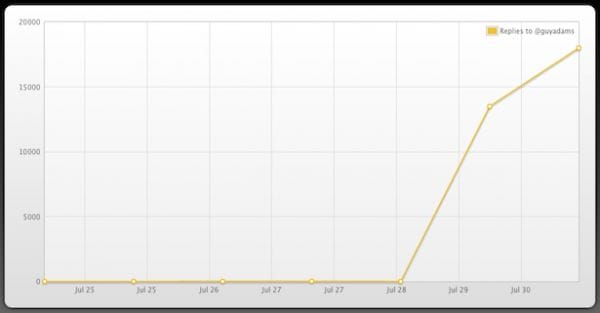Social Slipups: Suspended From Twitter, the Guy Adams Story

With a focus on social media blunders, Twitter gaffes, and Facebook faux pas, we’ll be profiling one politician, political figure, organization, or candidate who has committed one of the social media sins in our weekly series Social Slipups.
In the spirit of the Olympics, this week's Social Slipup will profile The Independent's Los Angeles correspondent, Guy Adams, focusing on his recent suspension from Twitter. The journalist was banned from the social network on July 28th, a ban that only lasted one day.
His sin:
It was his dissatisfaction with NBC's coverage that prompted him to post the work email of an NBC executive, inviting people to share their complaints. Twitter abruptly emailed him, informing him of their reasons for suspending his account:
"Your account has been suspended for posting an individual's private information such as private email address, physical address, telephone number, or financial documents," the company informed Guy Adams. "It is a violation of the Twitter Rules."
One day later, he regained access to his account, and tweeted this:
https://twitter.com/guyadams/status/230356309889929218

His complaint:
"NBC has clearly ignored what the viewing public wants throughout its coverage of the Olympics. If the President of NBC Olympics does not want to hear from the viewers... I don't think he's in the right job."
The catch:
Guy Adams was only without Twitter for one day, but the aftermath speaks volumes to the growing role of Twitter and the place for censorship online. Guy Adams' ban created waves in the world of journalism and social media by drawing into question the politices of Twitter. Had Guy Adams technically broken any rules? Or was the suspension a ploy to censor his speech on Twitter, whose commercial partnership with NBC may have been at risk.
Adams said of the event: "It really brought home to me as a journalist how much I rely on Twitter these days to do my job and, secondly, raised some questions about Twitter and its relationships with its commercial partners."
Ironically, the suspension backfired, with discussion surrounding the account @guyadams sharply increasing over the last week:

The Atlantic drives home this message in their article The Power of Internet Censorship:
In a networked world -- in a world that empowers users not only as subjects, but also as objects of discussion -- true suspension is much harder to achieve than it used to be. Each user carries with him or her a community of other people -- people who are not just fellow users, but also latent speakers of speech. Those people will make noise.
So what can we learn from this affair? Banning people on Twitter will likely amplify a message, not suppress it. Better luck next time Twitter.
For more, check out this Google Hangout with BuzzMachine's Jeff Jarvis and Reuters' Matthew Keys:
http://www.youtube.com/watch?v=NXdknP8_et0



